Updated 20th September 2018
To us unbelievers, he was certainly NOT the devil.
So, who really taught the blues guitar to Robert Johnson down at the crossroads? It wasn’t the devil, of course, but a certain Mr. Zimmerman. No, no, not Robert Zimmerman (Bob Dylan to us), but an African-American Mr. Zimmerman: Ike Zimmerman.
I wonder if Bob knows he shares a surname with Robert Johnson’s mysterious guitar tutor. Yes, I’m sure that he does. There’s not much Bob Dylan doesn’t know about the history of the blues.
But I’m pretty sure he didn’t about his namesake back in 1960, when Columbia’s John Hammond gave young Bob Dylan an acetate (an old fashioned preview record) of an album the company was about to release.
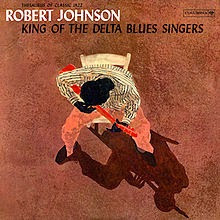 |
| One of the most influential blues albums of all time. From 1961. |
This was, ‘King of the Delta Blues Singers’, a compilation album by Robert Johnson issued in 1961.
Ranked number 27 on Rolling Stone magazine’s 500 most influential records of all time list, it is also considered one of the most influential blues records ever. Dylan was blown-away when he heard it. So, of course, was Eric Clapton. For more on the legendary John Hammond, check out my post on the link below, ‘The legacy of John Hammond and other blues musings’ from 15 October 2013. Please excuse the way it looks. Like this post, it lost all formatting when moved from my old blog to this one. Getting them into shape is like wrestling an octopus.
So, down to business. Most blues enthusiasts know the legend. Robert Johnson was an OK harmonica player but a lousy guitarist when he used to hang around the Dockery plantation on the Sunflower River, between Ruleville and Cleveland, Mississippi, as a youth. (See last post.) Suddenly, some time in the 1920s, young Robert disappears, then returns to the plantation some time later as an amazing blues guitarist and harp blower. He had met the devil at the crossroads, goes the myth, and sold his soul to Lucifer in return for unearthly musical ability. Let’s now bring that myth down to earth.
Recent research by Alabama Arts Radio in Montgomery, and Professor Bruce Conforth, an academic and Living Blues magazine contributor, paints a more realistic picture about how Robert Johnson mastered the blues guitar. When Johnson disappeared, it was to live for a year or two with the family of an accomplished black Delta blues guitarist and road contractor, four years his senior, Isaiah Zimmerman.
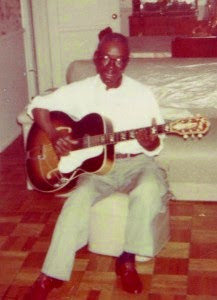 |
| Ike Zimmerman, Robert Johnson’s guitar teacher |
Originally a farmer from Alabama, Ike Zimmerman, his wife Ruth, their children and their boarder, Robert Johnson, lived for a while in the 1920s, in a three-room shotgun-shack, near the Beauregard cemetery in Mississippi.
Ike loved to play Delta blues, which he originally did in local juke joints across Alabama, then around Mississippi after he moved states. Indeed, so exceptional was Ike’s playing, rumours even persisted, back in the day, of Ike Zimmerman, just like Robert Johnson, learning to play supernaturally in graveyards at midnight. Such old wives’ tales had their genesis over a hundred years earlier, in superstitious Europe, when many believed similar stories about the Italian classical violinist Paganini, and his supposedly satanic powers. So, nothing is new. These were unsophisticated days, remember, and Ike Zimmerman and Robert Johnson did truly like to play their blues guitars and harmonicas in the cemetery. We’ll come to that in a moment but imagine just how scary blues guitar playing would sound, back in the 1930s, coming out of a graveyard, especially when caught on the wind.
But if you and I could learn to play the blues guitar like Lonnie Johnson or T-Bone Walker, simply by hanging around a graveyard, wouldn’t we all be doing it? It’s far more logical Ike Zimmerman and Robert Johnson were practicing in the graveyard at night purely to stop their music keeping Ike’s wife and kids awake.
Ike Zimmerman had a rare gift for teaching the guitar. Musician and scholar, Jason Rewald, on the ‘Delta Blues’ website says that many of Ike Zimmerman’s guitar students were actually women and one female guitarist in particular, who Jason says died not that long ago, had guitar skills on a par with Robert Johnson.
 |
| Robert Johnson in a pic taken inside a local photo booth |
“Robert was so eager to learn, that Ike literally taught Robert everything he knew,” writes Rewald. “Robert ate it up, and practiced diligently. We’ve all heard the story of Robert and Ike practicing in a nearby cemetery atop the tombstones. This cemetery, Beauregard Cemetery, is still there today. Robert and Ike would leave Ike’s home, take a small dirt road through the woods, cross over a crossroads, and walk right into the then white-owned cemetery to play. The occupants who lived around the cemetery remember being able to hear them play, both at night, and during the day. This path they travelled to the cemetery also lends a lot of credence to (the song) ‘Crossroad Blues’. If Ike represented the devil, the song takes on new meaning. Going down to the crossroads all seems to just make more sense. Of course, the song Crossroad Blues does not mention the devil by name, but it still lends credence to the ‘selling your soul’ to the devil, and the song itself.”
Other blues scholars say that Ike Zimmerman and his protégé actually played and practiced not only in Beauregard graveyard, but in several. This includes the nearby Hazelhurst cemetery, which is the usual location of this legend. But let Jason Rewald continued his revelations.
“It is common knowledge among the Zimmerman family that four recorded songs of Robert Johnson should actually be credited to Ike Zimmerman. His children claim they heard two of the songs well before Robert ever came to stay with them. As Ike often would play his kids to sleep, two of the songs were common tunes in the Zimmerman household … ‘Walking Blues’ and ‘Ramblin’ On My Mind’. According to them (Ike’s children), ‘Dust My Broom’ and ‘Come On In My Kitchen’ were tunes Ike wrote while Robert was there, writing them to assist in his teaching the blues to Robert. So maybe we could say they were co-written, but in all honesty, it sounds like those four songs were written by Ike himself.”
As well as the cemetery sessions, Ike and Robert often played in front of the fire in the Zimmermans’ cabin. “Some say Robert stayed with the Zimmermans close to two years,” continues Rewald, “but no one really knows. One little-kept secret is that the guitar was not all Ike would teach Robert. He also taught him how to play the harmonica. Robert, who was already decent at the instrument, would learn to master it as well – confirming stories later told by (bluesman) Johnny Shines that Robert was a proficient harp player.”
Eventually, says Rewald, after Robert had been taught all he felt he could be taught, he told Ike he was ready for live performances on the road. Ike agreed and told his pupil just how proud of him he felt. Ike even went one step further. He went out on the road with Johnson. They meandered to Texas, following each other in juke joints and on street corners. Often they played duets but more often they competed with each other: master and pupil. Finally, somewhere in Texas, Robert and Ike went their separate ways, Johnson saying he was headed for Memphis. Ike Zimmerman eventually became a pastor in Compton, near Los Angeles, trading blues for spirituals. He died around 1974 aged 67.”
As for Robert Johnson’s untimely death aged just 27, the cause is still unsubstantiated. The most common consensus is the entertainer was poisoned at a juke joint on the Star of the West Plantation, just north west of Greenwood, Mississippi. Robert was allegedly involved with the joint’s married barmaid who gave him whiskey after a performance, possibly poisoned by her jealous husband. There is also conjecture Robert Johnson had Marfan’s Syndrome, a life-threatening genetic disorder affecting the heart, blood vessels, bones, joints and eyes.
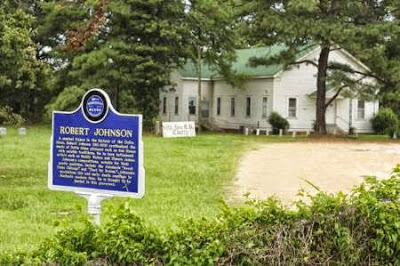 |
| Robert Johnson’s final resting place in Greenwood, Mississippi. Photo: Peter Thody |
|
He was certainly known to have ‘one bad eye’ and other symptoms such as extremely long fingers (check the more formal photograph of Robert Johnson in the last post) and a lean frame. His death certificate says Johnson was buried at Mount Zion Baptist Church on the Star of the West Plantation. On the back of this the local county registrar had written, “I talked with the white man on whose place this negro died and I also talked with a negro woman on the place. The plantation owner said the negro man, seemingly about 26 years old, came from Tunica two or three weeks before he died to play banjo at a negro dance given there on the plantation. He stayed in the house with some of the negroes saying he wanted to pick cotton. The white man did not have a doctor for this negro as he had not worked for him. He was buried in a homemade coffin furnished by the county. The plantation owner said it was his opinion that the negro died of syphilis.”
Most people agree the most common cause of Robert Johnson’s death was pneumonia, caused by a weakness in the immune system due to poisoning or Marfan’s Syndrome or brought on by syphilis. It’s no secret that Johnson was a ladies’ man, with a girl in almost every settlement he rambled through.




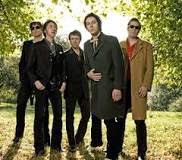
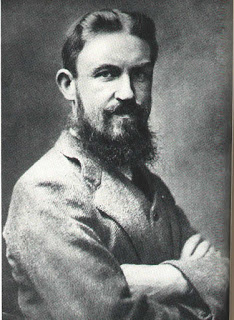


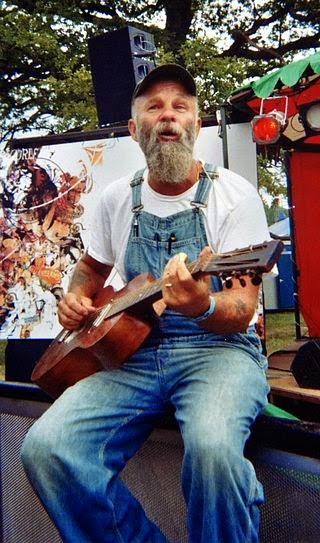

Ain't it strange that Ike Zimmerman was a mentor to Robert Johnson who was a mentor – posthumously – to Bob Dylan, aka Robert Zimmerman. Presumably Ike's surname was a given slave name. If you go back far enough, might the slave "owner" Zimmerman be related to Bob?
No offense but I believe Bob Dylan although at birth is named Robert Zimmerman, is of Jewish descent, and you will not find slave owners in Bob Dylan’s background.
Not to say though, that there were no slave owners named Zimmerman.
Louis Gates Jr show “Finding Your Roots” has an episode that mentions a slave owner with surname of Zimmerman…
African-American Ike Zimmerman certainly wasn’t a slave owner but perhaps his predecessors worked for slave owner called Zimmerman.
The killer blues headstone project placed a headstone for Ike.
That’s great to hear, Steven. Your Killer Blues foundation is doing a wonderful job.
I just heard of Ike Zimmerman through Robert Johnson’s grandson. I had always assumed Robert Johnson songs, like Patton and Leadbelly songs were common songs played by everyone back then. I thought these guys simply got the credit because they recorded them first. Hopefully Ike will get the recognition he writing credit he deserves as history unfolds.
Thanks for this article.
My pleasure, Erin. Thanks for the feedback.
The Zimmermans were from Turkish Jewry, emigrating about 1900.
Interesting, Albert. I didn’t know that. Wonder if Bob does.
Your article is startlingly annoying. Claiming to know or be certain about things you weren’t around to see- based on your views and the evidence you’ve compiled. Take the “of course” out of your pathetic attempt of the truth since you obviously don’t know for sure, at all…. you shouldn’t be writing.
It sounds like you believe Robert Johnson actually met the devil at the crossroads, Michael. I’ve written better articles, I admit, but the evidence compiled is the most complete evidence in existence. When I write “of course” it means I’m assuming the reader knows certain facts. Facts are the nearest thing we have for truth. If people like me don’t write about blues history, the early days of the genre will be lost to us forever.
My name is James Smith, Ike simmermon grandson. Everything I read in these articles the majority is true, there are some assumptions, I live with the story passed down to us, I’m not going to come there or debate on what’s real and what’s not because I know more than most out there now, some believe that Robert learn how to play at the crossroads and the devil told him, can you imagine, they rather believe that then believe a real human being as my grandfather talk expand how to play the guitar, which we all know so well in our family, I’m not going to give you a story of how all took place even though I know most, there are some that comment and don’t bleed Ike talk Robert which I know is a lie and my family know is a lie some discredit height as a guitarist for some reason I do not know why, but I finally know the truth we know how it happened and when it happened, all of you out there who do not believe our story, because it is our story, not yours, I’m sorry for you, because it is our story.
I’d love for you to share your story, James. The inside information in my post came from the American blues scholar, Jason Rewalt, who said he spoke to some of your family. But, thanks for your feedback, and if you change your mind about telling us your family’s stories regarding Ike, these pages are always open to you.
Brother, I’d absolutely love to hear your story.
Hey James, have I replied to your comment? I’m certain I did, but if not, apologies. Many thanks for your feedback.
Hi James, please help us know the truth. Thank you for coming here to comment. I know you might never read this but just want to say I am so thankful your grandfather is part of our musical history.
I live in Wesson, Mississippi. Beauregard cemetery is very close and my wife and I attend Beauregard Methodist. While attending a funeral in the Beauregard cemetery a church member pointed out a family grave enclosed by a fence. The two graves are raised marble and according to him the only graves like that in the cemetery. He believes that is where Ike and Robert practiced. I can submit a photo of the graves if you would like them.
That would be great, Stan. Much appreciated. Please send pic to paulgmerry@gmail.com
According to Bruce Conforth and Gayle Dean Wardlow, authors of ” Up Jumped The Devil–The Real Life of Robert Johnson “, Isaiah “Ike” Zimmerman was born on April 27, 1898 in Grady, Alabama. This new book, which just became available this month, has an entire chapter dedicated to Ike Zimmerman and his influence on Robert Johnson.
Many thanks for providing such important information, Greg. Sounds like a great book.
good article but i have some questions in doubt im sure he probably come across Zimmerman. But some things i find strange is he never wrote in any of his songs with Zimmermans name like he did with friend willie brown , . if he sang about the crossroads wondering why he didn’t sing about his time practicing in the graveyard. Also if he lived with him for two years thats a long time son house i recall said he was gone about 6 to 8 months . I am no expert . Only going by what i heard son house say with his own words . I do belieev he played harmonica because honey boy said that . Gee it can be very deep his journey sometimes trying to under stand it
Thanks for your feedback, Hobo. All I can suggest is perhaps RJ intended to write songs about singing in the graveyard but died before getting round it. As for not writing songs with Ike Zimmerman, Ike’s children said RJ passed off Ike’s songs as his own, even writing Dust My Broom to help RJ’s guitar playing. Who knows where the truth lies. Regarding Willie Brown, I know RJ played guitar and harmonica with him before getting Ike’s tuition. This was in 1930 with the audience reaction to RJ poor.
https://nationalbluesmuseum.org/stories-of-the-crossroads-blues-myths-did-robert-johnson-really-sell-his-soul-to-the-devil/
The eerie sounds wafting from cemeteries in the wind could explain some of the interpretations of some local’s stories, whose religious beliefs had West African voodoo influences. Papa Legba in particular. Mr Johnson’s quick mastery of playing might have garnered such a tale….
Couldn’t agree more, W.A.
The killer blues headstone project placed a headstone for Mr Z.
Great to hear, Steven. Richly deserved. You’re doing historic blues a great service.